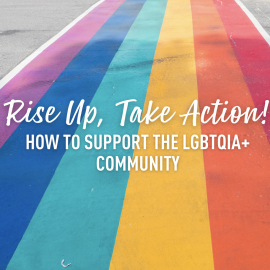Classroom Resources
Tips on having Difficult Conversations with Students
We are experiencing an unprecedented time of anxiety, uncertainty, and unrest in our country. Educators should take advantage of opportunities to engage difficult conversations with students about the challenging topics that are facing students right now. They are going through a lot and we need to be aware of where our students are coming from and how their identities shape their understanding. Challenging topics can affect students in unpredictable ways, but when properly approached, these difficult conversations can be very rewarding for students and provide an occasion to teach them self-awareness, critical thinking skills, civil discourse, empathy, and the importance of gathering evidence to inform ideas and opinions. Thinking of tackling a difficult topic in your classroom? The guidelines, suggestions, and resources here may be a good place to start.
- Recognize your unintentional biases. All people have implicit biases based on their background, upbringing, and personal experiences. Educators need to ensure they are investigating their own attitudes and beliefs before engaging with students. Unexamined biases in the classroom can unknowingly perpetuate inequality and negatively affect students and their ability to learn. Only when you honestly identify your biases can you use them to help you create a space for dialogue and inclusivity with your students. The non-profit research organization, Project Implicit has a series of tests that help us consider biases on a wealth of topics including: race, sexual orientation, religion, age, and disabilities.
- Know your students and take time to consider their identities. Building relationships with students goes a long way toward earning their respect and cooperation in the classroom. Students come to us with a variety of personalities, experiences, backgrounds, learning styles, and attitudes. Understanding where our students are coming from, what their needs are, and how we can best help them is an important part of leading a group of students and creating a student-centered space. This video about the importance of affirming student identity provides a thoughtful overview of the things educators should consider about their students. In addition to gathering information about each student’s life, take every opportunity to let students know that you care and are interested in their lives. Knowing what is happening in a student’s life and considering their identity helps educators best support them – emotionally and academically. This is particularly important right now as students navigate the ways that COVID-19 is affecting them. The National Education Association (NEA) recently published an article about helping students recover from COVID-19 related traumas.
- Set the stage. Classroom experiences for students as they address difficult issues should create opportunities for learning, engagement, conversation, and reflection. Be upfront with students about the fact that this is not easy, tensions may rise, and that it is okay to have strong emotions. Help them to understand that authentic discourse and the introduction to discordant ideas and new perspectives are part of learning – and that feeling uncomfortable can result in growth. Another important step is to include students in the process and create ground rules for these kinds of conversations. Realizing that this conversation contract can change is okay too – it can be a fluid set of guidelines that are revised after reflecting on the outcome of a difficult dialogue. Edutopia shared a great video about the importance of setting the stage and creating guidelines for engagement. Facing History and Ourselves created a resource focused on creating a classroom community and developing norms for interactions in an online space.
- Focus the discussion. Be explicit about what your goals are for before starting a difficult discussion with students. Connect the topic to course content and outcomes so that the students feel sharing their views is relevant. Consider providing students with pre-discussion assignment so they are prepared to articulate their ideas in advance when they are not in the heat of a potentially emotional situation. Likewise, be up front about what is expected in terms of providing evidence to support their opinions. Gather relevant information and background (from reliable sources) on the topic that speaks to both sides of the issue. The goal should be for students to gain a multifaceted understanding that encourages critical thinking and openness to new perspectives. It is a good idea to have a prepared list of discussion prompts and follow-up questions as it may be tough for students to get the conversation going. Ensure that there is time for a proper closing and synthesis of the discussion that relates back to the goals of the discussion. Finally, create reflection opportunities for the students to work through after the conclusion of the conversation to deepen student understanding of new information. The Center for Learning and Teaching at Washington University published a list of strategies for student discussions if you are looking for more ideas.
Educators have a responsibility to support students as they navigate challenging topics and to help them reflect upon their personal experiences to understand how they affect their views and opinions. Our role is not to indoctrinate or share personal views, but to facilitate understanding of different points of view and to ask the right questions that help students to be informed about the issue. We can help students to realize that opinions are fluid and that just because their friends or relatives believe something doesn’t mean they cannot form an independent and informed opinion.
Related Articles

The 2024 WorldStrides Student Photo & Video Contest Gallery
We are experiencing an unprecedented time of anxiety, uncertainty, and unrest in our country. Educators should take advantage of opportunities to engage difficult conversations with students about the...

Girl Scouts: Costa Rica Tour
We are experiencing an unprecedented time of anxiety, uncertainty, and unrest in our country. Educators should take advantage of opportunities to engage difficult conversations with students about the...

2024 Mérida Pride Parade
We are experiencing an unprecedented time of anxiety, uncertainty, and unrest in our country. Educators should take advantage of opportunities to engage difficult conversations with students about the...

Rise Up, Take Action: How to Support the LGBTQIA+ Community
We are experiencing an unprecedented time of anxiety, uncertainty, and unrest in our country. Educators should take advantage of opportunities to engage difficult conversations with students about the...


